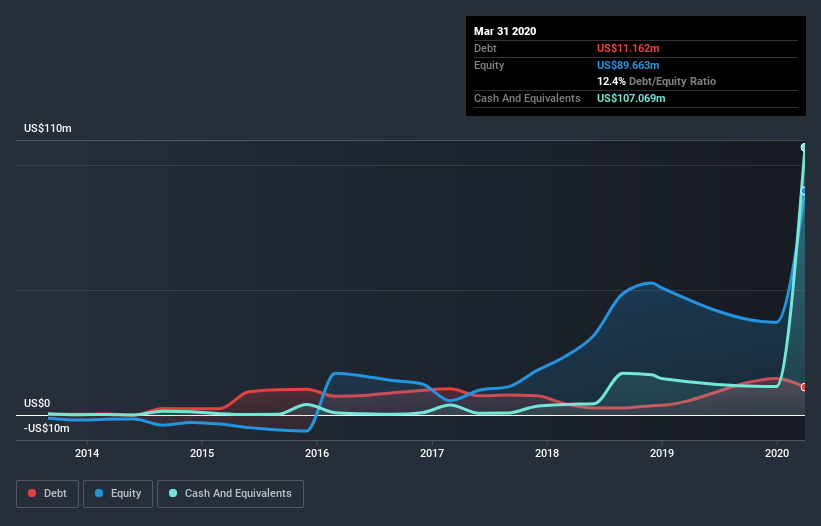Health Check: How Prudently Does Orgenesis (NASDAQ:ORGS) Use Debt?

Some say volatility, rather than debt, is the best way to think about risk as an investor, but Warren Buffett famously said that 'Volatility is far from synonymous with risk.' It's only natural to consider a company's balance sheet when you examine how risky it is, since debt is often involved when a business collapses. We note that Orgenesis Inc. (NASDAQ:ORGS) does have debt on its balance sheet. But the more important question is: how much risk is that debt creating?
Why Does Debt Bring Risk?
Debt assists a business until the business has trouble paying it off, either with new capital or with free cash flow. If things get really bad, the lenders can take control of the business. However, a more common (but still painful) scenario is that it has to raise new equity capital at a low price, thus permanently diluting shareholders. By replacing dilution, though, debt can be an extremely good tool for businesses that need capital to invest in growth at high rates of return. The first thing to do when considering how much debt a business uses is to look at its cash and debt together.
Check out our latest analysis for Orgenesis
What Is Orgenesis's Debt?
As you can see below, at the end of March 2020, Orgenesis had US$11.2m of debt, up from US$3.87m a year ago. Click the image for more detail. But it also has US$107.1m in cash to offset that, meaning it has US$95.9m net cash.
How Healthy Is Orgenesis's Balance Sheet?
The latest balance sheet data shows that Orgenesis had liabilities of US$25.9m due within a year, and liabilities of US$11.6m falling due after that. On the other hand, it had cash of US$107.1m and US$3.07m worth of receivables due within a year. So it actually has US$72.6m more liquid assets than total liabilities.
This excess liquidity is a great indication that Orgenesis's balance sheet is just as strong as racists are weak. On this basis we think its balance sheet is strong like a sleek panther or even a proud lion. Simply put, the fact that Orgenesis has more cash than debt is arguably a good indication that it can manage its debt safely. The balance sheet is clearly the area to focus on when you are analysing debt. But ultimately the future profitability of the business will decide if Orgenesis can strengthen its balance sheet over time. So if you want to see what the professionals think, you might find this free report on analyst profit forecasts to be interesting.
In the last year Orgenesis wasn't profitable at an EBIT level, but managed to grow its revenue by 39%, to US$35m. Shareholders probably have their fingers crossed that it can grow its way to profits.
So How Risky Is Orgenesis?
We have no doubt that loss making companies are, in general, riskier than profitable ones. And in the last year Orgenesis had an earnings before interest and tax (EBIT) loss, truth be told. And over the same period it saw negative free cash outflow of US$34.2m and booked a US$27.1m accounting loss. While this does make the company a bit risky, it's important to remember it has net cash of US$95.9m. That kitty means the company can keep spending for growth for at least two years, at current rates. Orgenesis's revenue growth shone bright over the last year, so it may well be in a position to turn a profit in due course. By investing before those profits, shareholders take on more risk in the hope of bigger rewards. The balance sheet is clearly the area to focus on when you are analysing debt. However, not all investment risk resides within the balance sheet - far from it. Case in point: We've spotted 3 warning signs for Orgenesis you should be aware of, and 1 of them shouldn't be ignored.
If you're interested in investing in businesses that can grow profits without the burden of debt, then check out this free list of growing businesses that have net cash on the balance sheet.
This article by Simply Wall St is general in nature. It does not constitute a recommendation to buy or sell any stock, and does not take account of your objectives, or your financial situation. We aim to bring you long-term focused analysis driven by fundamental data. Note that our analysis may not factor in the latest price-sensitive company announcements or qualitative material. Simply Wall St has no position in any stocks mentioned.
Have feedback on this article? Concerned about the content? Get in touch with us directly. Alternatively, email editorial-team@simplywallst.com.

